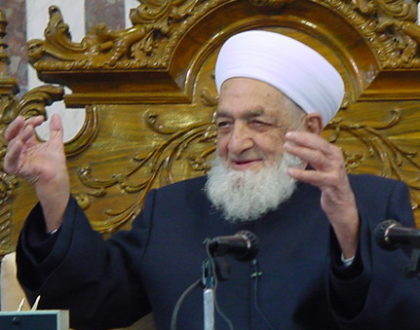Reflections on the Islamic Penal Law – A Clear Look at Islam –

By: Faysal Burhan
Published: 2002
Law and Order
Islam recognizes that morality and ethics are the roots of every decent society; in the fabric of Islam, there is an abundance of social and spiritual traits geared to provide better living habits. However, these traits are not enough insurance against misconduct. Shari’ah, the Islamic Law, is a community moral law used to manage and govern a Muslim society and control its members’ behavior to ensure its safety. The state enforces the Shari’ah law utilizing the power of consequences, penalties, or remedies. An authorized body such as a legislature or court creates the rules in modern-day societies. While this type of legislation is exact in Islam, the basic rules of Shari’ah are divine.
As Karen Armstrong stated in her book, ‘Muhammad: A Biography of the Prophet,’ “Unlike Christianity, which came to birth under the Roman empire where the social and political order was already established, Jesus and St. Paul had to worry about the spiritual order mainly, Arabia had no political or social order,” Muhammad had to build a whole civilized society. Besides establishing the spiritual aspects, he also had to erect social and political issues. Hence, the state’s affairs and the civil, social, and political aspects of Muslims’ lives are as divine as spiritual. This consideration makes obedience to the rule an act of rewarded worship.
Penalty
Islam’s philosophy concerning the spread of misconduct is rooted in prevention. Part of the prevention mechanism is a severe penalty. The severity of the punishment of a Muslim serves as a giant deterrent to committing a crime. Because of the severity of the sentence, most people would not commit the violation or even begin to think of following it through.
The likeness of this policy is much like the common practice of lawsuits in the United States. Such suits cost violators millions of dollars in penalties, effectively keeping many would-be violators honest. An example is the multi-billion dollar lawsuit against the tobacco companies Philip Morris, R.J. Reynolds, Brown and Williamson, Lorillard, the Leggett Group, and Brooke Limited. These companies were charged with reckless disregard to misrepresent information relating to health that cost over 200 billion dollars to one class case and over 246 billion dollars to 46 states’ claims.
The stiffer penalties in traffic laws are similar to the current expensive lawsuits implemented to reduce accidents and death. In the same way, today’s courts of Law are stiffening the penalties and sentences to limit violations. For example, removing a traffic citation point from the driver’s record in 2003 required eighteen months versus six months in the middle of the 1980s. Similarly, the intoxicant level found in drunk-driving citations has risen from 0.12% in the mid-seventies to 0.08% in the 2000s. This restriction has saved thousands of lives from death in drunk driving accidents.
Illustrated below is the psychological effect of the severity of punishment on people’s behavior. According to Islamic Law, the maximum penalty for professional theft is cutting hands. However, it should be understood that this policy does not mean that there is a hand to be cut for every robbery. See ‘Sentence Executions’ below.
The judge also imposes other forms of punishment, such as imprisonment or fines. The mere existence of the hand-cutting rule has prevented theft from growing to the level of proficiency and organized crime in Muslim societies. The severe effect of hand-cutting as a punishment for theft and the shameful impact it has had have almost eliminated this social disease in Muslim societies.
Similarly, the penalty for murder in Islamic Law is death (Capital Punishment). The wisdom in the severity of the sentence is saving lives. The Qur’an states:
And there is (a saving of) life for you in al-Qisas, the Law of equal penalty (killer to be equally killed);
O you men of understanding, that you may restrain yourselves. Qur’an, 2:180
The natural human instinct is to avoid and fear death. Therefore, setting legislation that destines one who slays a soul for execution due to their actions is a reasonable restriction for not committing the crime, saving lives. Thus, many lives are protected by setting this equal punishment, eliminating sorrow and sadness for the missing and loved ones.
Sentence Executions
The maximum sentence for any violation of the Law is not applied in every case. For example, in robbery and theft cases, the maximum penalty for hand-cutting applies after considering many factors. Factors such as track record and whether the theft was for profit. Sometimes, there may not be a penalty, such as stealing food for severe hunger or preventing death. An actual example during the Rule of Caliph Umar can illustrate this fact. A master brought his servant to Caliph Umar to cut his hand for stealing. Umar asked the defendant whether he had taken from his master’s property. When the servant did not deny the accusation, Umar asked him why he did it. The servant explained that he did it because his family had nothing to eat. Upon this, the plaintiff concurred that the defendant’s claim was valid.
The plaintiff’s further questioning led Umar to determine that the plaintiff was at fault for not providing his servant enough food, labor, and shelter. Then Umar ordered the plaintiff to furnish his servant’s needs adequately, and the case against the servant turned out to be a case against his master. This example asserts that Shari’ah is a community law based on fairness and justice.
Alternatives to a Capital Punishment
The penalty for murder is death. However, the Islamic judicial system permits settlements and forgiveness depending on the circumstances. Thus, there is a substitute for capital punishment in Islamic Law. Allah makes it more rewarding for the slain family to forgive than to execute the death sentence on the murderer.
O ye who have believed, prescribed for you is legal retribution for those murdered, the free for the free,
the enslaved person for the enslaved person, and the female for the female (no one other than the killer should be executed).
If the slain’s brother makes any remission, then grant any reasonable demand and compensate
him with handsome gratitude. This is a concession and a mercy from your Lord. Qur’an, 2:178
Thus, the victim’s family has the right to demand punishment or to ask for monetary compensation. The third alternative the Islamic Law provides is pardon. The Holy Qur’an states that people should forgive.
But if you pardon, overlook, and forgive, Allah is Forgiving and Merciful. Qur’an, 64:14
Regarding forgiveness, Dr. Ingrid Mattson of Hartford Seminary states,
“Because forgiveness itself is an act that frees the people who have been harmed from the sense of anger and the sense of victimization, it empowers them to have some control of the situation by giving that act of forgiveness.”
Flexibility and Ambiguity
Relaxing or stiffening a penalty for a particular violation is integral to Islamic Law. The punishment in Islamic Law is dependent on the nature of the crime. Factors such as the damage’s severity, the violator’s background, their intent, and the offense’s repetition play a significant role in determining the penalty’s extent. Furthermore, the Prophet said:
Avoid (the maximum) penalty (hudud) on account of ambiguity (shubuhat). -Al-Termizi and Al-Bahaqi
Since punishment is a deterrent, and if the Law’s intent in a particular case is fulfilled, the judge can apply a lower sentence and avoid the maximum penalty. Similarly, the judge may increase the penalty for a specific case if necessary. The Islamic judicial record contains examples illustrating how Islamic Law served justice. An unusual fact of the Prophet himself shows the ultra sensitivity of Islam towards justice.
A Jewish person named Zayd ibn al-Luthah approached Prophet Muhammad, grabbing him by the clothes on his chest and saying: “You, the family of Abu Talib, are mutle, delinquent, in making payments.” Umar ibn al Khattab stood by, pulled out his sword, and said: “O Prophet of Allah, order me to cut this man’s head.” The Prophet replied: “No, Umar does not cut his head. Instead, you should counsel him to be polite when he asks for his rights and ask me to give him his money in due time.”
According to the Prophet, the money he borrowed from Zayd ibn al-Luthah was due the following week. Nevertheless, the Prophet ordered Umar to give Zayd 8 dinars that he owed him and an extra 8 dinars. When Umar objected and said: “O Prophet, why the extra 8 dinars?” The Prophet replied: “This was a reward for him because you scared him with your threat.” Zayd ibn al-Luthah then said: “O Prophet of God, our Scripture told us that one of the signs of the Expected Prophet is that he will be with ample patience, I was only examining your patience, and I believe you are the Prophet of God.” See al-Wafaa be Ahwal al Mustapha by al Jawzi.
Only people with passion and deep love for others can take the kind of high ground that Prophet Muhammad did in this case.
The Spread of Vice
Islam sets vigorous controls to minimize the publicity of vice in a community. Advertising of evil leads to its acceptance, and acceptance of sin leads to society’s degeneration. The Qur’an teaches:
And do not approach (avoid all situations that might lead to)
unlawful sexual intercourse. Indeed, it is ever an immoral and evil way. Qur’an, 17:32
O you who have believed, indeed, intoxicants, gambling, (sacrificing on) stones
alters (to other than Allah), and divining arrows are but defilement from the work of Satan,
so avoid (distance yourself from anything remotely related to) it that you may be successful. Qur’an, 5:90
Say: My Lord has only forbidden immoralities, what is apparent, and what is concealed, as well as sin and oppression without right. Qur’an, 7:33
Indeed, those who like that immorality be spread (or publicized) among
those who believe there will be a painful punishment in this world and the Hereafter. Qur’an, 24:19
Thus, to limit the news of vice and corruption, Islam made it challenging to prove fornication or adultery cases. Below, read what Allah said in this regard:
The woman and man found guilty of sexual intercourse, lash each one of them with a hundred lashes
and do not be taken by pity for them in the religion (i.e., Law) of Allah and those who launch a charge
against chaste women and produced not four witnesses (to support their allegation),
flog them with eighty stripes and reject their evidence… Qur’an, 24:2-4
The penalty for adultery and fornication is 100 lashes. The penalty purifies the person from the sin in this world and saves them from the Hereafter punishment. One can imagine the lesson a particular Muslim society learns from the adultery execution of one of its members. This lesson will make each member stay as far away as possible from even thinking of committing such a grave sin.
To determine fornication or adultery, Islam requires the accuser to produce four witnesses. Each witness must testify that they saw the penis in the vagina. If one was unsure of this act, all four witnesses must be lashed eighty times for false accusation and the spread of gossip.
The possible penalty for conveying fornication gossip and the four witnesses’ condition severely restricts the legal cases in the court of Law. These restrictions help prevent sexual chatter from becoming a common occurrence that may ease its acceptance into the community. While Islam made these severe restrictions for fornication cases to reach the legal system, it has left the door wide open for sinners of such crimes to repent and change their sinful habits privately.
Justice and Guarding Safety, not Imposing Penalty.
Islamic Law intends to prevent crime and establish justice and fairness, not merely to impose harshness and rigidity. Therefore, avoiding penalty execution is recommended even when an actual sin is committed. Let us look closely at an example from the Prophet’s days to substantiate our claim. A lady named al Ghamediyah came to Prophet Muhammad and said: “O Prophet of Allah tah-Herni, purify me from my sin; I have committed adultery.” He said: “Maybe you kissed.” She said: “No, O Prophet, I committed adultery.” He said: “Maybe you touched.” She said: “No, O Prophet, I committed fornication.”
At this point, the Prophet told her to return after three months. Three months later, al Ghamidyah came back. He asked her if she was carrying a baby in her womb. Her answer was positive. He then sent her away, telling her to return after she bore the child. When she had the child, she returned to the Prophet, asking him to execute the penalty. Again, Prophet Muhammad sent her away, saying: “Go breastfeed the child for two years.” When the two years were over, al Ghamidyah was at the doorstep of the Prophet again, asking him to apply the rule to her. At this point, the Prophet ordered the penalty.
Several modern-day scholars, such as Dr. Adnan Ibrahim, disputed al Ghamidyah’s story and maintained that the Qur’anic penalty for adultery is leashing, not stoning. Dr. Ibrahim held al Ghamidyah’s story, which is unauthentic.
If al Ghamidyah’s story was true, it shows the Prophet was not eager to execute her sentence, especially when she had a fetus in her womb. Preserving souls, after all, is a sacred rule in Islam. Furthermore, he did not order her into prison or issue a warrant to capture her partner-in-crime to execute the penalty on him since he had also sinned.
In its severe penalty, the spirit and essence of Islamic Law are to save lives, stop corruption, disallow mischief, serve justice, build a safer society, and apply little or no penalty.
Recommended Posts

The Eternal Values
August 28, 2017




I was recommended this blog by my cousin. I am not sure whether this post is written by him as
nobody else know such detailed about my trouble. You’re incredible!
Thanks!
The author is given at the top of the page of the article. Below is the link anyway, but thanks for your comment.
https://www.islamic-study.org/about-us/about-the-author/